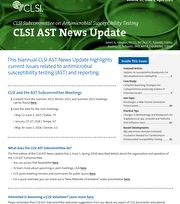You'll receive the latest updates on new standards, guidelines, and educational resources, as well as expert insights to help enhance your laboratory's performance and compliance.
Insights
Explore the latest developments in laboratory standards, guidelines, and best practices. Our expert perspectives and stories provide up-to-date information about what's new in laboratory testing.
All Insights
Filters
{{ sortLabels[option] }}
July 8, 2025
CLSI experts will be attending ADLM 2025 in Chicago, Illinois 27-31 July. Here's your guide to key talks you won't want to miss!
June 9, 2025
CLSI recently hosted it's June 2025 Committees Week in Frisco, Texas. Here are key highlights from the meetings.
Antimicrobial Susceptibility Testing
May 16, 2025
If you missed us on April 29, Testing With Confidence: Evaluation Protocols and Strategies for Compliance, don’t worry. Here’s a recap of key panel discussions and how you can still get involved.
May 5, 2025
CLSI is hosting the annual AST Committees Week Meeting May 31-June 3rd. This event is vital to the continued collaboration of laboratory professionals dedicated to quality patient care and pushing AST standards forward.
Antimicrobial Susceptibility Testing
May 1, 2025
S. maltophilia is a motile gram-negative bacillus, frequently identified as a nosocomial pathogen in individuals with indwelling devices, long-term hospitalization or intensive care unit (ICU) stay, chronic respiratory disease, or an immunocompromising condition.
AST News
May 1, 2025
A 34-year-old patient with quadriplegia was admitted with tachypnea and fever. A diagnostic evaluation for pneumonia was performed, including a molecular pneumonia panel and respiratory cultures on expectorated sputum.
AST News
May 1, 2025
Rezafungin is a novel systemic antifungal agent of the echinocandin class, which was approved by the US Food and Drug Administration (FDA) in March 2023 for the treatment of candidemia and invasive candidiasis in adults with limited treatment options.
AST News
May 1, 2025
Tedizolid disk diffusion breakpoints for staphylococci, beta-hemolytic streptococci and viridans streptococci were added to CLSIM100 in 2024.
AST News
May 1, 2025
CLSI M24 provides a standard method for antimicrobial susceptibility testing (AST) of rapidly growing mycobacteria (RGM), including M. chelonae.1
AST News
April 25, 2025
We spoke with CLSI volunteer Dr. Aleksei Tikhonov, PhD about the vital role CLSI volunteers have in supporting laboratory professionals and ensuring quality across labs worldwide.
Volunteer
No Results
No results were returned for that query.





